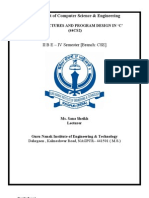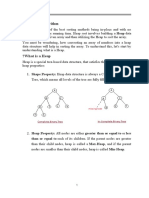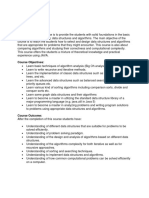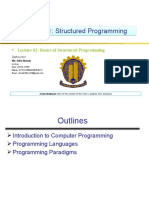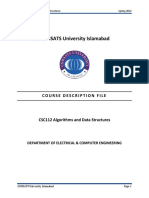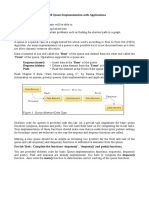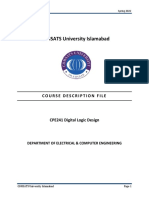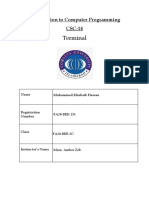CSC211 Data Structures and Algorithms
Uploaded by
Souban JavedCSC211 Data Structures and Algorithms
Uploaded by
Souban JavedCSC211
Data Structures and Algorithms Spring 2022
COMSATS University Islamabad
COURSE DESCRIPTION FILE
CSC211 Data Structures and Algorithms
DEPARTMENT OF ELECTRICAL AND COMPUTER ENGINEERING
COMSATS University Islamabad Page 1
CSC211 Data Structures and Algorithms Spring 2022
COMSATS University Islamabad
COURSE DESCRIPTION FILE
CSC211 Data Structures and Algorithms
DEPARTMENT OF ELECTRICAL AND COMPUTER ENGINEERING
Prepared By: Checked By: Approved By:
‐‐‐‐‐‐‐‐‐‐‐‐‐‐‐‐‐‐‐‐‐‐‐‐‐‐‐‐‐‐‐‐‐‐‐ ‐‐‐‐‐‐‐‐‐‐‐‐‐‐‐‐‐‐‐‐‐‐‐‐‐‐‐‐‐‐‐‐‐‐‐ ‐‐‐‐‐‐‐‐‐‐‐‐‐‐‐‐‐‐‐‐‐‐‐‐‐‐‐‐‐‐‐‐‐‐‐
COMSATS University Islamabad Page 2
CSC211 Data Structures and Algorithms Spring 2022
Algorithms and Data Structures
Course code:
CSC211 (3+1)
Prerequisites:
CSC103: Programming Fundamentals
Course Catalog Description:
This course provides an introduction to the design and analysis of fundamental data structures and
algorithms. The topics cover: Introduction to design patterns; Basic algorithms analysis; Fundamental data
structures ‐ implementation strategies for stacks, queues and linked lists; Recursion; Implementation
strategies for tree and graph algorithms; Hash tables; Applications of data structures (e.g. data
compression and memory management). A special emphasis is placed on programming and hands‐on
experience, meant to reinforce the theoretical aspects covered in lectures.
Textbooks:
1. Aaron M. Tenenbaum, “Data Structures Using C and C++”, Pearson Education, 2nd Edition
2. Dharmender Sing Kushwaha, Arun Kumar Misra, “Data Structures a Programming Approach with C”,
PHI.
Reference Books:
1. Robert Sedgewick, Kevin Wayne, “Algorithms”, Addison‐Wesley, 4th Edition
2. Thomas H. Cormen “Introduction to Algorithms”, The MIT Press, 2nd Edition
3. Reema Thareja, “Data Structures using C”, Oxford University Press, 2nd Edition
Course Learning Objectives:
The purpose of this course is to provide the students with solid foundations in the basic concepts of data
structures and algorithms. The main objective of the course is to teach the students how to select and
design data structures and algorithms that are appropriate for problems that they might encounter. This
course is about abstract data types, their associated algorithms and studying their computational
complexities. Moreover, this course offers the students a mixture of theoretical knowledge and practical
experience.
Course Learning Outcomes:
1. Ability to describe different types of data structures and algorithms and their applications. (C2‐PLO1)
2. Develop computer programs to implement different types of data structures (such as arrays, lists,
stack, queues, trees, and graphs) and their associated algorithms. (C3‐PLO2)
3. Analyze algorithms such as sorting, searching, recursion, divide‐conquer, hashing techniques etc. (C4‐
PLO2)
4. Write programs that use data structures (arrays, strings, linked lists, stacks, queues, graphs and hash
tables etc) and algorithms. (A3‐PLO5)
COMSATS University Islamabad Page 3
CSC211 Data Structures and Algorithms Spring 2022
Course Schedule:
3 credit hours lecture 2 equal sessions / week
One laboratory session/week (3 hours/session)
Topics Covered:
Body of knowledge identify by No of
Topics (Book’s chapter title or
Unit IEEE/ACM Guide line (Page 34, teaching
topics
Appendix A) hours
Introduction, why do we need Data
1 AL/Basic Analysis 1.5
Structures.
Linked Lists
2 F/Data Structures Doubly Linked List, Circular List, Linked Lists 4.5
Vs. Arrays, Assignment 1
Stacks, its implementation
Stack Applications (Parsing, Arithmetic 3
3 expression evaluation), Infix to pre‐fix and
post‐fix conversion, Expression Evaluation
F/Data Structures from Post‐fix
Queues: its implementation, Quiz 1
4
Queue Applications: Circular Queue, 3
Priority Queue
Recursion
5 PF/Recursion 3
Implementing Recursion
Introduction to Algorithm Analysis, Big‐O
Notation.
6
AL/Fundamental Algorithms Bubble, Selection and Insertion sort. 3
Merge sort, Quick sort
Introduction to Trees, the basic concepts
Tree Traversals, Traversing Binary Trees
7 PF/Data Structures (Level order, Pre order, Post order and In 4.5
order) Searching, inserting and deletion in
and balancing of Binary Search Trees
8 PF/Data Structures AVL Trees, Quiz 2 1.5
Heaps Assignment 2
9 PF/Data Structures 3
Heaps Contd.
COMSATS University Islamabad Page 4
CSC211 Data Structures and Algorithms Spring 2022
Introduction to Graphs, Quiz 3
Graph Implementations Assignment 3
10 PF/Data Structures 3
Graph Traversals: Breadth First Search
and Depth First Search
Dijkstra’s Shortest Path First Algorithm,
10 PF/Data Structures 4.5
Minimum Spanning Trees
Hashing, Hashing Key Value Concept,
Mapping functions, Handling the Collisions
chaining, overflow areas, re‐hashing, using
11 PF/Data Structures neighboring slots (linear 3
probing),quadratic probing, random
probing
Hashing Contd., Quiz 4
12 PF/Data Structures Huffman Coding, Assignment 4 3
13 Revision 1.5
Terminal Examination 12
Total no. of Hours 42+3=45
Assessment Plan:
Theory Quizzes (4) 15%
Homework assignments 10%
Mid‐term exam (in class, 60‐80 minutes) 25%
Terminal exam (3 hours) 50%
Total (theory) 100%
Lab work Lab reports (12) 25%
Lab Mid‐term exam 25%
Lab project and terminal exam 50%
Total (lab) 100%
Final marks Theory marks * 0.75 + Lab marks * 0.25
Learning Outcomes Assessment Plan (Tentative):
Sr. # Course Learning Outcomes Assessment
1. Quiz 1
2. Quiz 2
3. Quiz 3
4. Quiz 4
COMSATS University Islamabad Page 5
CSC211 Data Structures and Algorithms Spring 2022
5. Assignment 1
6. Assignment 2
7. Assignment 3
8. Assignment 4
9. Mid‐term Exam
10. Terminal Exam
Table 1: Assessment Plan for Course Learning Outcomes
Laboratory Experiences:
Estimated Lab
Sr. # Lab Title
Hours
1. Introduction, Recap of the previous programming concepts 3
2. Singly Linked List Implementation 3
3. Doubly Linked Lists and Circular Linked Lists Implementation 3
4. Stack Implementation with Applications 3
5. Queue Implementation with applications 3
6. Sessional 1
7. Implementation of recursion 3
8. Sorting Implementation 3
9. Quick and Merge Sort Implementation 3
10. Binary search tree implementation 3
11. Sessional II
12. AVL trees implementation 3
13. Binary Heaps Implementation 3
14. Implementation of graphs 3
15. Hashing Implementation 3
16. Huffman Coding Implementation 3
COMSATS University Islamabad Page 6
CSC211 Data Structures and Algorithms Spring 2022
Computer Resources:
For the purposes of this course, the software such as GNU C Compiler and IDE are installed in the
laboratory that is used for implementation of data structures and algorithms.
Mapping Course Learning Outcomes (CLOs) to Program Learning Outcomes (PLOs):
PLO 1 Engineering Knowledge: An ability to apply knowledge of mathematics, science,
engineering fundamentals and an engineering specialization to the solution of complex
engineering problems.
PLO 2 Problem Analysis: An ability to identify, formulate, research literature, and analyze
complex engineering problems reaching substantiated conclusions using first principles
of mathematics, natural sciences and engineering sciences.
PLO 5 Modern Tool Usage: An ability to create, select and apply appropriate techniques,
resources, and modern engineering and IT tools, including prediction and modeling, to
complex engineering activities, with an understanding of the limitations.
PLOs
PLO10
PLO11
PL012
PLO 9
PLO1
PLO2
PLO3
PLO4
PLO5
PLO6
PLO7
PLO8
CLOs
CLO1 C2
CLO2 C3
CLO3 C4
CLO4 A3
Table 2: Mapping CLOs to PLOs
Version Applicable From
Version 1 Fall 2019
COMSATS University Islamabad Page 7
You might also like
- Hourglass Workout Program by Luisagiuliet 276% (21)Hourglass Workout Program by Luisagiuliet 251 pages
- Read People Like A Book by Patrick King-Edited57% (82)Read People Like A Book by Patrick King-Edited12 pages
- Livingood, Blake - Livingood Daily Your 21-Day Guide To Experience Real Health77% (13)Livingood, Blake - Livingood Daily Your 21-Day Guide To Experience Real Health260 pages
- Donald Trump & Jeffrey Epstein Rape Lawsuit and Affidavits83% (1016)Donald Trump & Jeffrey Epstein Rape Lawsuit and Affidavits13 pages
- The 36 Questions That Lead To Love - The New York Times94% (34)The 36 Questions That Lead To Love - The New York Times3 pages
- The 36 Questions That Lead To Love - The New York Times95% (21)The 36 Questions That Lead To Love - The New York Times3 pages
- Jeffrey Epstein39s Little Black Book Unredacted PDF75% (12)Jeffrey Epstein39s Little Black Book Unredacted PDF95 pages
- 14 Easiest & Hardest Muscles To Build (Ranked With Solutions)100% (8)14 Easiest & Hardest Muscles To Build (Ranked With Solutions)27 pages
- The 4 Hour Workweek, Expanded and Updated by Timothy Ferriss - Excerpt23% (954)The 4 Hour Workweek, Expanded and Updated by Timothy Ferriss - Excerpt38 pages
- CSC203 - Digital Logic Design - Past QuestionsNo ratings yetCSC203 - Digital Logic Design - Past Questions9 pages
- Christian Thibaudeau Men Transformation Plan Updated PDF100% (10)Christian Thibaudeau Men Transformation Plan Updated PDF117 pages
- Data Structures & Algorithm Course Outline PDF50% (2)Data Structures & Algorithm Course Outline PDF2 pages
- Numerical Analysis Course Outline OBE BasedNo ratings yetNumerical Analysis Course Outline OBE Based3 pages
- OOP - I GTU Study Material Presentations Unit-1 07022022102854PMNo ratings yetOOP - I GTU Study Material Presentations Unit-1 07022022102854PM59 pages
- Array Functions (2D Array) : Each Questions CarryNo ratings yetArray Functions (2D Array) : Each Questions Carry5 pages
- ASSIGNMENT 1 - Basic Concepts of Analysis and Design of AlgorithmsNo ratings yetASSIGNMENT 1 - Basic Concepts of Analysis and Design of Algorithms3 pages
- Data Structures Part - A (Shortanswer Questions) : Vemu Institute of TechnologyNo ratings yetData Structures Part - A (Shortanswer Questions) : Vemu Institute of Technology6 pages
- Association - Aggregation and Composition OOPsNo ratings yetAssociation - Aggregation and Composition OOPs8 pages
- DSA Lab Manual Solved by M.Daud Sajid 028 BSSE4A FA21No ratings yetDSA Lab Manual Solved by M.Daud Sajid 028 BSSE4A FA21162 pages
- 11-Best Case, Worst Case, Average Case Analysis-08-08-2022No ratings yet11-Best Case, Worst Case, Average Case Analysis-08-08-202245 pages
- Ec2202 - Data Structures and Object Oriented Programming in C++ Model Question Paper Total Marks: 100 Part A - (10 X 2 20 Marks) Answer ALL QuestionsNo ratings yetEc2202 - Data Structures and Object Oriented Programming in C++ Model Question Paper Total Marks: 100 Part A - (10 X 2 20 Marks) Answer ALL Questions6 pages
- Computer Organization & Assembly Language: 1 - An IntroductionNo ratings yetComputer Organization & Assembly Language: 1 - An Introduction35 pages
- Discrete Structures CLS's and PLO's With Weekly Course Contents100% (1)Discrete Structures CLS's and PLO's With Weekly Course Contents6 pages
- Discrete Structure Notes by Samujjwal Bhandari100% (2)Discrete Structure Notes by Samujjwal Bhandari151 pages
- Bahria University (Karachi Campus) : Midterm Examination - Spring Semester - 2020 (Computer Programming CSC-113)No ratings yetBahria University (Karachi Campus) : Midterm Examination - Spring Semester - 2020 (Computer Programming CSC-113)4 pages
- Data Structure and Algorithm: Lecture No 1 Prepared by Muhammad Farhan100% (1)Data Structure and Algorithm: Lecture No 1 Prepared by Muhammad Farhan31 pages
- I Semester BCA Examination (NEP - SCHEME) : Subject: Computer ScienceNo ratings yetI Semester BCA Examination (NEP - SCHEME) : Subject: Computer Science2 pages
- Data Structure Most Important Question All Unit100% (1)Data Structure Most Important Question All Unit7 pages
- DBMS Unit-1 PPT 1.1 (Introduction, Drawback of File Sysstem, View of Data)No ratings yetDBMS Unit-1 PPT 1.1 (Introduction, Drawback of File Sysstem, View of Data)4 pages
- Final Course Outline Programming Fundamentals0% (1)Final Course Outline Programming Fundamentals11 pages
- Practical Model Paper Computer Science HSSC-PracticalNo ratings yetPractical Model Paper Computer Science HSSC-Practical2 pages
- 2.data Structures - CS301 Fall 2009 Mid Term PaperNo ratings yet2.data Structures - CS301 Fall 2009 Mid Term Paper8 pages
- Simple Sorting and Searching Algorithms 2.1searching: PseudocodeNo ratings yetSimple Sorting and Searching Algorithms 2.1searching: Pseudocode7 pages
- Design and Analysis of Algorithms: Lab ManualNo ratings yetDesign and Analysis of Algorithms: Lab Manual57 pages
- Final Exam - Design and Analysis of Algorithms - Fall 2010 Semester - SolNo ratings yetFinal Exam - Design and Analysis of Algorithms - Fall 2010 Semester - Sol7 pages
- Lecture 5 - Algorithm Design TechniquesNo ratings yetLecture 5 - Algorithm Design Techniques21 pages
- Mutee Abdullah FA20-BCE-068 BCE-3B: Implementation of Circular Doubly Linked Lists in C LanguageNo ratings yetMutee Abdullah FA20-BCE-068 BCE-3B: Implementation of Circular Doubly Linked Lists in C Language7 pages
- CSC141 Introduction To Computer ProgrammingNo ratings yetCSC141 Introduction To Computer Programming8 pages
- CPE251 Probability Methods in EngineeringNo ratings yetCPE251 Probability Methods in Engineering7 pages
- CPE314 Data Communication and Computer NetworksNo ratings yetCPE314 Data Communication and Computer Networks9 pages
- Electronics 2 Lab Report #10 Submitted To: DR Khurram Ali Submitted By: Wahaj Rahim Fa18-Bee-160CNo ratings yetElectronics 2 Lab Report #10 Submitted To: DR Khurram Ali Submitted By: Wahaj Rahim Fa18-Bee-160C11 pages
- Lab 06: Wheatstone Bridge, Delta To Wye and Wye To Delta TransformationNo ratings yetLab 06: Wheatstone Bridge, Delta To Wye and Wye To Delta Transformation7 pages
- Pages From LAB MANUAL EEE241 Digital Logic Design-Unlocked PDFNo ratings yetPages From LAB MANUAL EEE241 Digital Logic Design-Unlocked PDF11 pages
- Terminal: Introduction To Computer Programming CSC-14No ratings yetTerminal: Introduction To Computer Programming CSC-147 pages
- Disruptive Technologies ECP-102: Experiment No.:-1.1No ratings yetDisruptive Technologies ECP-102: Experiment No.:-1.113 pages
- Power Over Ethernet - Wikipedia, The Free EncyclopediaNo ratings yetPower Over Ethernet - Wikipedia, The Free Encyclopedia7 pages
- DVR 690HD Digital Camcorder Waterproof: User ManualNo ratings yetDVR 690HD Digital Camcorder Waterproof: User Manual57 pages





































